I’m addressing Nietzsche’s claims found in The Anti-Christ, summarized in this video (link). If you couldn’t tell, Nietzsche was not a fan of Christianity itself. We’ll get into why in a bit.
Nietzsche himself was sort of indifferent about Jesus Christ the historical figure, (harshly) criticizing Him for His legacy and ideology. At times, he indirectly praises Him though. He quips in The Anti-Christ: “There was one true Christian, and He died on the cross”.
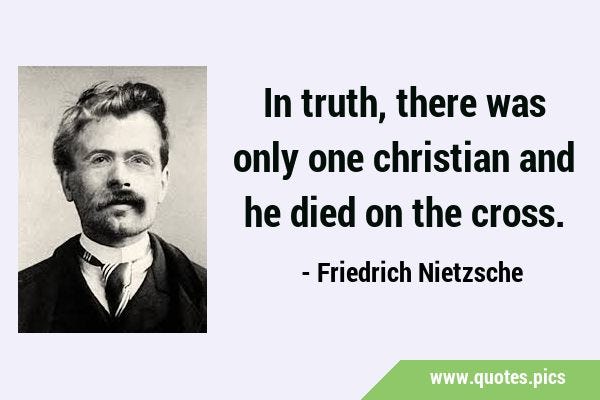
Note: we will be discussing Jesus Christ as a historical figure, not necessarily as a religious figurehead.
Nietzsche, the self-styled psychologist, sought to sort people into archetypes. This is a very 19th Century way of doing business in psychology, a la Jung, Freud, Carlisle. He evaluates historical figures based on their adherence to archetypes, the most famous of them being the Heroic archetype- the Ubermensch. Napoleon, a figure Nietzsche particularly loved, fit this definition criteria.
Where does Nietzsche ere in analyzing Jesus Christ?
The most glaring issue is in Nietzsche’s textual analysis. He champions another 19th century movement, Biblical Historicism. Riding the momentum of Enlightenment rationalism (Author’s note: erm, how un-based), these guys attempted to (dis)prove the Biblical narrative by evaluating the bible’s claims empirically. In other eras, people just took for granted that Jesus was a historical figure that really existed regardless of His claims of divinity. Biblical Historicism challenged these assumptions, trying to make entrenched Christianity walk back its claims and demote Jesus from “historical figure” to “embellished myth”, the same tier as Wotan and Santa. Some of them were essentially the Reddit atheists of the day, attempting to find surviving archeological evidence that Jesus was crucified on Golgotha, or even trying to locate the pots of water He turned into wine.
There is a wealth of information that validates the claims the Bible makes. In fact, Jesus is easily one of the best documented people in Ancient History. The primary (Gospels) and secondary (Jewish, Roman, Greek, and Near Eastern scholarly documentation) sources we have are leagues above most notable figures from the Ancient world combined. To say nothing of the primary sources:
For example, Herodotus was essentially the only camera man for much of what we know of the Greco-Persian war era. His SINGULAR depiction of events is how we understand them today- even with his questionable track record of embellishing (he’s called “history’s first blogger” for a reason). Of course, this is partly because the history of that era was more about telling a good story than the literal truth, myth being a completely valid way of transmitting information.
I’m Le rambling..
It relates to Nietzsche because he was in the same sphere as the Mfs that unilaterally accepted everything that someone like Herodotus said, but had a problem with the claims about a figure 10,000,000x better documented than anyone Herodotus wrote on. I called them Reddit atheists because they attempted to reject the Biblical narrative on ridiculous, cartoonish-ly midwitted grounds. For instance, they couldn’t find the LITERAL cross a rabble rouser from a minor province was executed on 1800 years prior. It’s not even just disingenuous, it’s stupid.
Nietzsche readily accepts the extremely radical stances of this crowd, that the Bible is riddled with contradictions and errors and is just a collection of fables meant to issue precepts. He willingly endorses even the most outlandish attacks on the Gospels, writing in The Anti-Christ:
Ironically, this is one of the least empirical, rationalist stances to take on the New Testament. The hardline “everything in the Bible is fake” position has been dead in biblical academia for centuries, even while Nietzsche was writing this. It doesn’t matter how hard Nietzsche frantically shrieks into the sky about not liking the evidence, it remains unchanged. The crying about the “absence of corroborative documents” is objectively, inarguably wrong. Incorrect.
But, this only highlights a bigger problem with Nietzsche’s reading of the Gospels. He attempts to arrange the argument in a way where his conclusion is unavoidable. He wants Christianity to put both hands behind its back so he can punch without worrying about being punched back. Even secular scholars today, even the least inclined to grant Jesus “historical figure” status like Dr. Bart Ehrman, will not touch anything Nietzsche claims about the Gospels with a 10 foot pole. “Archaic” is a nice way to say it.
Once the attempt to box Jesus off as “just a myth that can be workshopped to fit the needs of His followers” fails, the whole thing unravels. Nietzsche needs the Jesus of the Gospels to be an invention because he wants to attack the psychology of it all: that Jesus’ disciples were weak slave moralists, they retconned a weak Jesus into existence, and exported weakness around the globe.
Nope.
Jesus Christ, the Hero.
Now, my definition of “hero” is probably 10% different from Nietszche. Nietzsche’s hero is one that inflicts himself on others, typically by achieving some great feat. Nietzsche pops a chub for the way Napoleon unflinchingly sent millions of men into meat grinders. To him, spilling oceans of common stock blood for the conquest aims of the aristocracy is the definition of heroic. He salivates over the way the men of heroic archetype force the world to bend to their needs, referring to them as “men out of time”, vestigial souls that swim upstream in the world they’re born into to remake it in their vision. Again, he references how Napoleon was a product of Revolutionary France, bending it to his will instead of embracing its democratic values. Naturally, he doesn’t much care for his own created caricature of Jesus:
Now, Jesus didn’t feed human waves into a pointless conflict. In fact, the Sanhedrin and Pharisees hated him because He didn’t! The savior they wanted was a military general, someone to lead Jewish forces against the occupying Romans- a David or Maccabeus more than a Solomon or Yeshua Bar Mariam.
Jesus did have a conflict- just not the one Nietzsche wants. He conquered death, something every hero of the ancient world put together and Nietzsche himself failed to do. He destroyed the forces of evil on earth for all time, a victory more complete and history defining than anything Napoleon or anyone else ever did.
This aside, Jesus Christ ironically perfectly fits Nietzsche’s own definition of a hero. He remade the entire world, for all time, in His image. He brought empires to their knees, all without drawing a sword. He exploded onto the scene, a man out of time. Jesus was born into the brutal ancient world, one that operated on slave labor and pointless bloodshed. Like I said in the other post, this was a time when people were perfectly fine with slaves dying of smoke inhalation to heat their bath tubs. And yet, Jesus did not bend to this world. He asserted His will on the world, and crushed it into submission to His vision, His ideas. In the course of a 3 year ministry, Jesus laid the foundation for a kingdom that is built on the opposite of this, of love! To the Ancients, a society based on love was unfathomable, equally as strange as someone today trying to found a society based on comedic ability.
And yet, He did this with a motley crew of tax collectors, fishermen and shepherds (the Ancient equivalent of construction workers), prostitutes and lepers. All of the world’s aristocrats could do nothing to stop this revolution, all of the so-called heroic leaders of Ancient history ultimately bending the knee to Him or His legacy. They could not spill enough blood, launch enough conquests, topple enough civilizations to slow the momentum of the Jesus movement at all. Today, even people who reject Christianity itself are functional Christians, with Christian assumptions about the world in a Christian framework. Nietzsche’s alignment with the radical rationalists of his time is itself an admission of the power of Jesus Christ.
Another Nietzschean misinterpretation: crying about the “kingdom of God” and discussions of eternity.
Nietzsche was among the first to trot out the “promising you things so you’ll follow Him” shart. He writes (excessively) about how Christians are spineless and effeminate, because they’re so focused on the Kingdom of God inside themselves. In other words, they sit there and take it because they want to get to heaven:
Instead, Jesus’ life and testament display something far grander. First, he does not do what Walt Kowalski accuses the priest in Gran Torino of doing:
Instead, Jesus tells us that the mark of a true Christian is suffering. That your life gets harder when you live according to His radicle principles. A life of suffering requires strength to endure. That is a key component that Nietzsche misses. Nietzsche wants Jesus to act like a Saturday morning cartoon character, instantly overcoming any challenge effortlessly. He forgets that Jesus could’ve instantly exploded the heads of anyone that confronted Him. He does not. Instead, He does what takes more strength: He tells Peter to sheathe his sword, and puts the dude’s ear back on his head before submitting to a sham trial put on by people He could also easily head explode.

Who is stronger? The Nietzschean Hero who kills his way to the top of his street gang in Detroit, or Pope John Paul II for forgiving the man who attempted to kill him? You’re lying to yourself if you don’t admit that the latter requires an insane amount of inner, mental, spiritual strength. The former is just indulging your primal, feces flinging temptations. Restraint requires strength. Extending mercy requires having the strength to not extend mercy. “Kill anyone who disrespects you” is the sort of convenient, boring, temporary solution of a nearsighted worldly man. Those guys are a dime a dozen, and not particularly interesting. The Kingdom of God is in the man that can see above earthly, ultimately irrelevant squabbles. Nietzsche wants you to slaughter your way into the history books. Many have tried, and almost all have been buried by time. Jesus Christ tells you to love your way into the hearts of all you come across, and you live in His world.
So no, Nietzsche’s load bearing interpretation of “turn the other cheek” is not accurate. Neither is his analysis of the psychology of Christ. Because Jesus was a real person, He has a spectrum of moods, attitudes, quotes. There’s an entire book about how the Bible has blatantly contradictory messages on sexual desire. For every “turn the other cheek” there’s a

and a
and the classic:
Does this mean Jesus is some sort of Germanic warlord hero archetype? Hell nah. Nor am I qualified to say whether He is or isn’t. I’m saying picking out a singular quote (or even a collection of them) and using it to assume things about Jesus is retarded. Straight up. Knowing Jesus takes a lifetime of study, to develop the mindset to understand the scriptures. Nietzsche certainly did not know Jesus well enough to meaningfully criticize Him, and was particularly lacking in the ability to correctly interpret scripture and information about Him.
Conclusion
Nietzsche’s criticisms of Christ the historical figure are pretty lacking. He fails to understand the person he seeks to critique, and turns a blind eye to His accomplishments that would grant instant hero status by any other name. This is a dude that said Schopenhauer was a hero, but Christ was not. Mkay. Yup.
I have to end on this Napoleon quote again, it neatly ties up everything I said about Jesus’ legacy. It particularly stings for Nietzsche that Napoleon at least respected Jesus (I think Napoleon was a Christian but not particularly zealous, in the way Robert E Lee was), because Nietzsche spends an inordinate amount of time throwing it back for Napoleon:
The full quote really dynamites Nietzsche’s Heroic archetype argument, as his textbook example himself refutes Nietzsche:
Bonus quote:




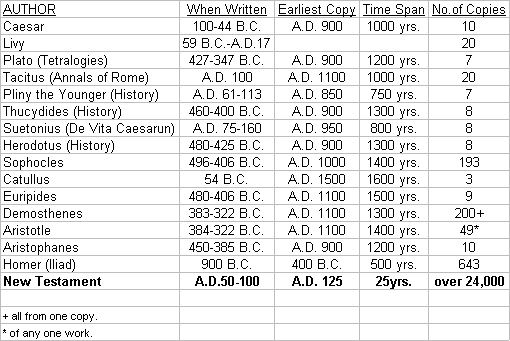
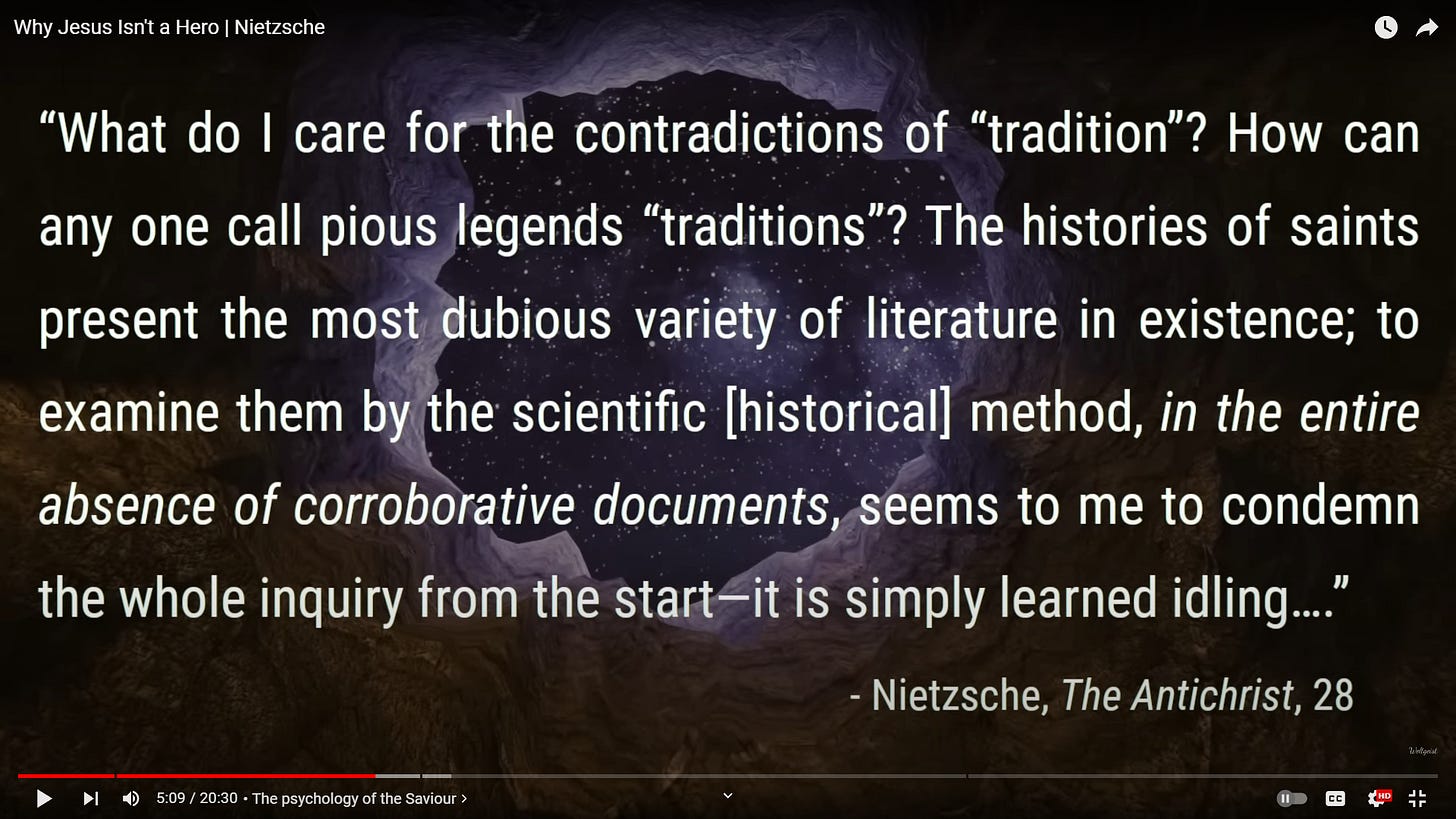


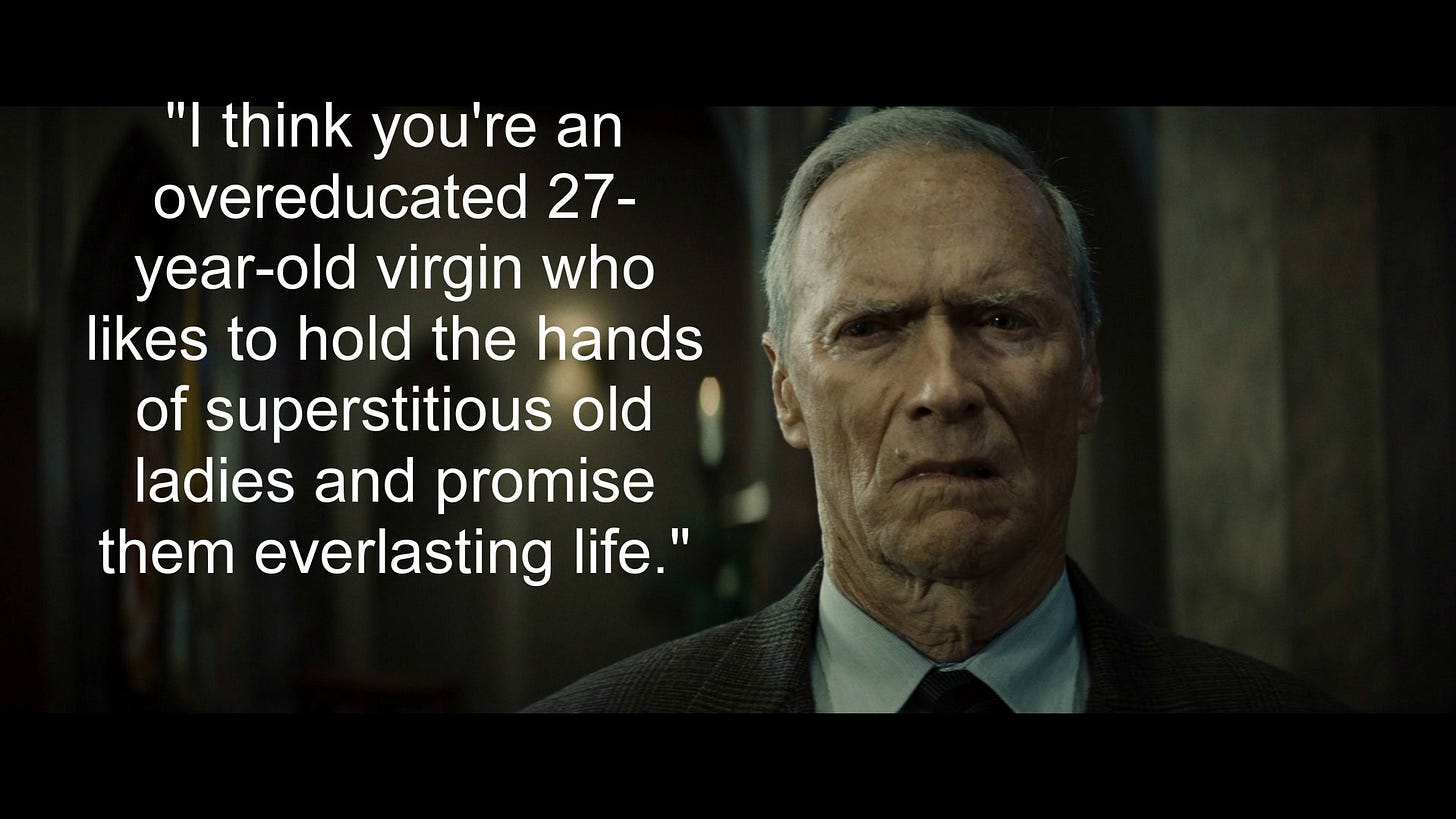


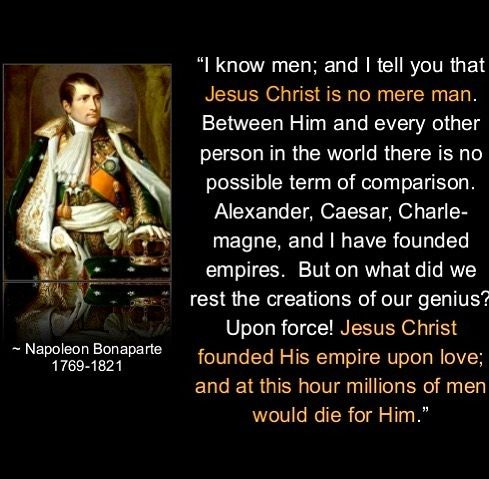
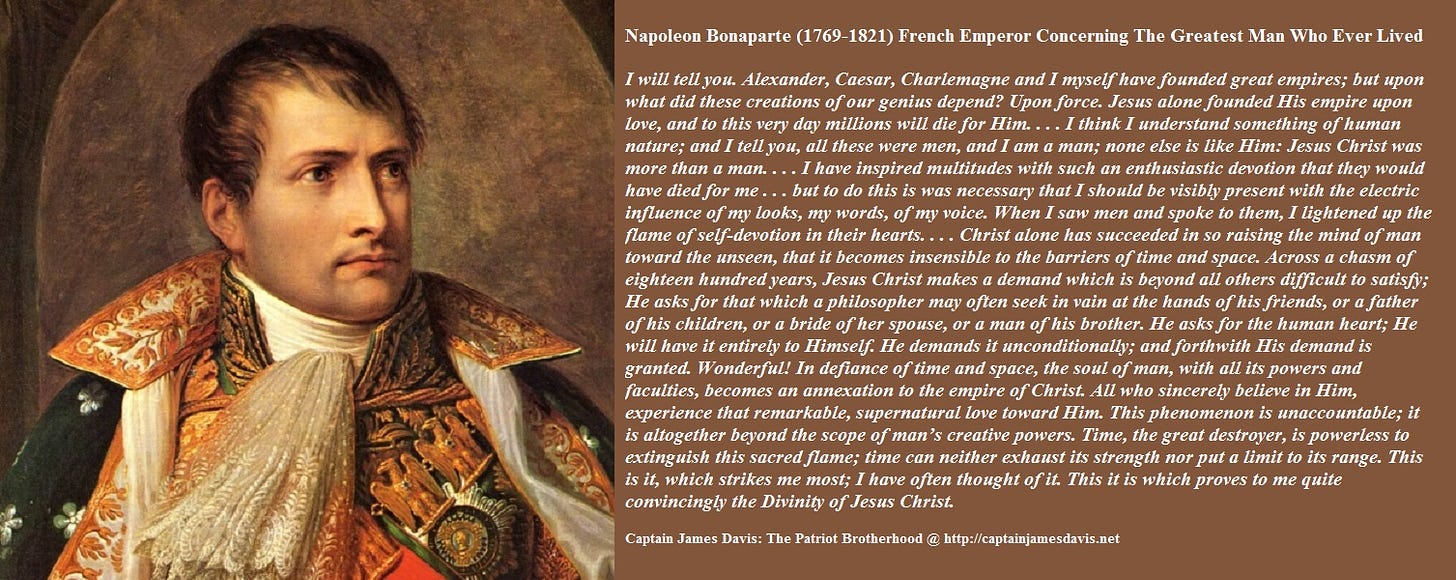
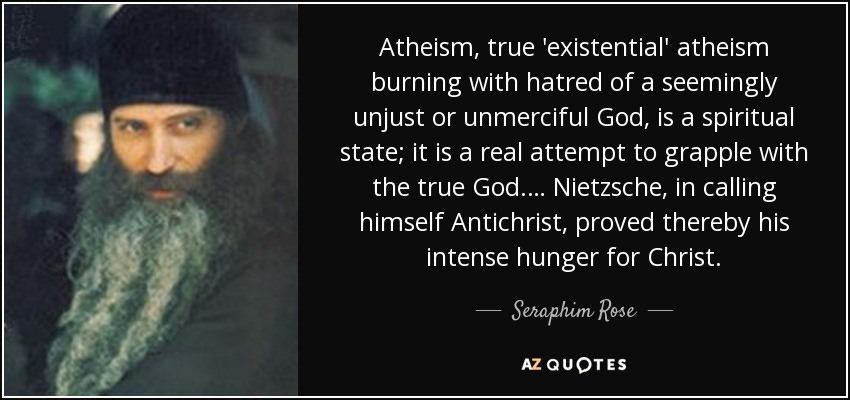
There was a lot more I wanted to say here, like how Nietzsche also reaches for the "telephone game" argument and uses Napoleon as an example. Low chance of a part 2, but I will deal with Nietzsche's critiques of Christianity more either way.
I will appreciate this post far more than you'll ever know.
Thank you.